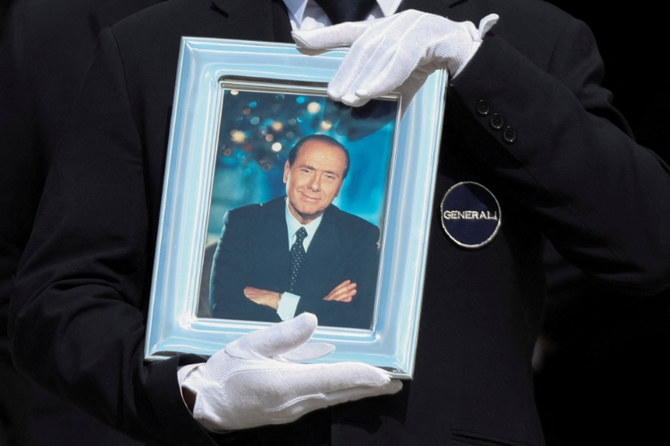Why Europe needs a united front on Libya

https://arab.news/8u2zq
With the death of former Italian Prime Minister Silvio Berlusconi, we were reminded of the special links and relationships he developed with Libyan leader Muammar Qaddafi.
They were in stark contrast to the days a century ago when Omar Al-Mukhtar, the “Lion of the Desert,” was fighting the Italian occupier and colonialism. It was in a sense a pragmatic relationship and came at a time of isolation for Libya. It mixed politics, migration and energy as well as investments and business interests. It was a snapshot of what “North-South” diplomacy has become today.
Libya is still facing instability and confrontation more than 10 years after the fall of Qaddafi, with higher risks of spillover since the start of the conflict in Sudan. Curiously, we hear most pundits and analysts discuss interference in the conflict by regional powers from the Middle East. But the warming of relations between, notably, Turkiye and Egypt among others shows that this was never the core of the problem. In reality, the problem was the divide between France and Italy.
One might even say that relations between Italy’s new Prime Minister Giorgia Meloni and French President Emmanuel Macron might look more problematic than those between Libyan Prime Minister Abdul Hamid Dbeibah and and eastern warlord Khalifa Haftar. The verbal attacks on Meloni by the French camp in preparation for the European elections are an example of this situation. The continuous accusations of being far right directed at Italy’s first female prime minister are adding to tensions on all issues. This goes both ways, and one remembers how Meloni in a clip about Africa and migration accused France of exploiting African resources instead of investing in capacity building. These conditions are indeed not auspicious for successful solutions in Libya, or in Africa for that matter.
Differences between France and Italy are unlikely to yield significant outcomes for either. Instead, Russia and China are benefiting.
Khaled Abou Zahr
These differences between France and Italy are unlikely to yield significant outcomes for either. Instead, Russia and China are benefiting. Moreover, Italy has fostered an energy partnership with Algeria, a former French colony, and has prompted a re-evaluation of Algeria’s ties with Russia. So the focus and fight revolve greatly around energy, especially since the war in Ukraine. Italian company Eni’s deal with Dbeibah did not ease tensions, quite the opposite. In the mutual accusations, Meloni accused France of interfering in Libya to impede Italy’s access to crucial energy-related concessions. She also attributed the current chaos of illegal immigration faced by Europe to French intervention in Libya.
The reality is that France and Italy primarily face a challenge on the political future of the EU’s foreign policy, and within this framework the future of order in the Mediterranean region. The southern countries of the Mediterranean have witnessed a transformation that has translated into greater geopolitical power, especially on energy, deployment into Africa, and migration. This has sown division among Europeans looking to secure energy flows and economic stability.
The divisions run across European borders and are linked to different political visions; more tactically, for the time being they affect forthcoming European elections. This means Europe needs to move to the next step: voting for its foreign policy representatives. Indeed, there is a series of contradictions between not only France and Italy but also with Germany. And since Brexit, the EU can no longer blame the UK for its divisions: it needs to start a new process for a unified vision.
France under Nicolas Sarkozy and before the so-called Arab Spring tried to bring forward a new vision and engagement within the Mediterranean. And before favoring military strikes on Qaddafi troops, he looked to develop stronger links. These the same principles and objectives that pushed Berlusconi to strengthen his ties with Qaddafi: his approach to the Mediterranean was the right one, and he foresaw the rise of the South Mediterranean as a power house.
Before moving forward on such a grandiose European vision, it is nevertheless urgent for both France and Italy to start by settling their differences and presenting a united front for a solution in Libya. Then the EU as a whole needs a new foreign and defense strategy. This new vision should also include a renewed initiative for the Mediterranean. A unified European plan for the Mediterranean would remove many of the nationalistic tensions in North Africa and Africa. It is also urgent, as Europe has been losing ground. A solution for Libya would start this process and correct a dangerous path. As long as various actors know they can play on the differences between France and Italy to gain more ground, there is little chance for problems to be solved.
Berlusconi understood the new energy and business global order; he flipped relations with Libya and built close links with Qaddafi. Just as he managed his football clubs and his media empire, he understood that bringing the best players or the most beautiful presenters and keeping them on the bench or behind the cameras was better than seeing them play for the opposing team or dancing for competitors. Europe needs to sort out its leadership and then have this pragmatism to protect its geopolitical and energy interests.
• Khaled Abou Zahr is the founder of Barbicane, a space-focused investment syndication platform. He is chief executive of EurabiaMedia and editor of Al-Watan Al-Arabi.










































